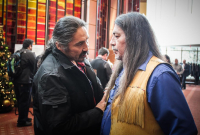Support strong Canadian climate journalism for 2025
Oilsands giant Syncrude Canada wants a judge to dismiss a lawsuit by a former first responder who claims he was wrongfully fired following a diagnosis of post-traumatic stress disorder.
Michael Swan filed the lawsuit in Alberta Court of Queen's Bench late last year seeking damages for lost compensation and benefits, improper paycheque deductions and in lieu of reasonable notice. His also seeks "moral or aggravated damages for bad faith throughout the employment relationship" and punitive damages.
"Syncrude denies that the plaintiff was at any time penalized due to his disability or that Syncrude failed to treat the plaintiff with civility, decency, dignity and respect," the company said in a statement of defence filed last month.
"At no time during the plaintiff's employment did Syncrude demonstrate an intention not to be bound by the employment agreement. The plaintiff, however, relocated from Fort McMurray to Calgary without notice to Syncrude and subsequently abandoned his employment."
The claims by Swan and Syncrude have not been tested in court.
Swan, 44, began working for Syncrude in 2002 as a heavy equipment operator at its mining operations north of Fort McMurray, Alta. Five years later, he joined the company's fire department, which sometimes responds to calls in the surrounding community.
The former firefighter and paramedic has said that no single event triggered his PTSD, but that it built up gradually. He said his symptoms were in full force by the time a ferocious wildfire swept into Fort McMurray in 2016. He was diagnosed a year later.
Syncrude said Swan attended an intake screening for a traumatic psychological injury program organized through the Workers' Compensation Board in October 2017, but he "unilaterally chose not to return" for treatment.
Swan explained Wednesday that he joined the program later than Syncrude wanted because his own psychologist wished to ensure Swan was in the right condition for it.
He said the program offered structured full-day treatment that included group sessions, exercise and meditation. He said he found it challenging and rewarding.
"By the time I was ending it, I had come so far. I was able to talk with people and share my experience, which aids people suffering from PTSD immensely."
In February 2018, Syncrude told Swan he had to return to work within a week, even though his care team and the WCB did not think he was ready, his lawsuit alleges.
Swan said he completed the program last summer. While he found it helpful, he said he spent a lot of time there dealing with his anger at Syncrude rather than his PTSD.
Syncrude disputes Swan was being forced back to work too soon.
"Syncrude relied upon the available medical reports and medical advice when formulating the gradual return-to-work plan for the plaintiff, and, further, Syncrude had no contradicting medical reports indicating that the plaintiff should not return to Fort McMurray or the Aurora Mine site."
Swan said Syncrude first punished him for joining the program too late and then again for staying in it too long. He was fired last September.
Syncrude spokesman Leithan Slade said Thursday the company has nothing to add to its statement of defence "other than that Syncrude greatly values and supports its employees."
Swan said he'll never work as a first responder again, but he's exploring retraining options through the WCB.
The WCB's support is helpful, he added, but he is under financial strain. His sister has set up a GoFundMe page for legal and medical expenses.
"This is embarrassing, but I'm collecting some bottles and stuff and rolling change," he said.
"I'm not looking for a handout or to be set up the rest of my life. I'd just like to hold Syncrude accountable and get back to the workforce."





Comments